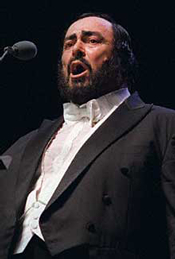
23 Sep 2007
GIORDANO: Andrea Chénier
Andrea Chénier, an opera in four acts.
Andromaca: Dramma per musica in three acts.
Ermione: Azione tragica in two acts.
Ippolito ed Aricia: Tragedia in five acts.
Idomeneo: Opera seria in three acts.
Paride ed Elena: Dramma per musica in five acts.
Orphée: Opera in four acts.
Music composed by Christoph Willibald Gluck (arranged by Hector Berlioz, 1859). Libretto by Ranieri de' Calzabigi
Alceste, ou Le triomphe d’Alcide: Tragédie en musique in a prologue and five acts.
Alceste: Tragédie opéra in three acts.
Medea: Melodramma tragico in three acts.
Oedipe à Colone: Tragédie lyrique in three acts.
Elektra: Tragedy in one act.
Fedra: Dramma per musica in two acts.
Les Troyens: Grand opéra in five acts.
Die Meistersinger von Nürnberg: Music drama in three acts.
Ariadne auf Naxos, Oper with a prologue and one act. Music composed by Richard Strauss. Libretto by Hugo von Hofmannsthal.
Der Schauspieldirektor [The Impresario], Singspiel in one act, K486.
Divertimento teatrale in one act.
La figlia del reggimento [La Fille du régiment (‘The Daughter of the Regiment’)], Opéra comique in two acts.
L’elisir d’amore, Melodramma giocoso in two acts.
La Bohème, opera in four acts. Music composed by Giacomo Puccini. Libretto by Giuseppe Giacosa and Luigi lllica, based on episodes from Henri Murger’s Scènes de la vie de Bohème.

Andrea Chénier, an opera in four acts.
Music composed by Umberto Giordano (1867–1948). Libretto by Luigi Illica.
First Performance: 28 March 1896, Teatro alla Scala, Milan.
| Principal Characters | |
| Andrea Chénier, a poet | Tenor |
| Carlo Gérard, a servant | Baritone |
| Madalena de Coigny | Soprano |
| Bersi, her maid | Mezzo-Soprano |
| Madelon, an old woman | Mezzo-Soprano |
| La Contessa de Coigny | Mezzo-Soprano |
| Roucher, a friend of Chénier | Bass |
| Pietro Fléville, a novelist | Bass |
| Fouquier Tinville, the Public Prosecutor | Bass |
| Mathieu, a sans-culotte | Baritone |
| An Incroyable | Tenor |
| The Abbé, a poet | Tenor |
| Schmidt, a jailer at St. Lazare | Bass |
| Master of the Household | Bass |
| Dumas, president of the tribunal | Bass |
Setting: The environs of Paris, 1789–93.
Synopsis:
Act I
As the curtain rises, the servants of the Countess of Coigny are preparing for a ball. Among them is Gérard, afterward to become a revolutionary leader; he is filled with indignation at the sight of his aged father bent from years of set vile labor for the aristocrats. When the guests have arrived, a typical eighteenth century court pastoral is performed for their entertainment: while the chorus, dressed as shepherds and shepherdesses, sing idealized rustic music, the ballet mimic a rural love story in stately court fashion. Among the guests is the poet, Andrea Chénier, whose work is growing popular just at this time. When the Countess asks him to improvise he refuses, but when her beautiful daughter, Madalena, pleads with him he consents. She has rather coquettishly suggested the subject “Love,” but he soon forgets this, and singing of the misery and suffering of the poor, he launches into a tirade against those in power in church and state.
All but Madalena are outraged by the idealistic social and human creed shown in this dramatic song; and when a crowd of ragged men and women appear headed by Gérard, only to be ordered from the castle, Chénier follows them.
Act II
Chénier, now a revolutionary, is advised to flee by his friend. “Roucher. who has managed to bring a passport for him. Chénier refuses to leave without Madalena. Strangely enough, she arrives, incognito, and begs now a revolutionary power and attracted to her. They linger for a brief love scene, and are about to go, when they are caught by Gérard. While the rivals take to their swords, Madalena is spirited away. Gérard, wounded, he believes mortally, magnanimously warns Chénier to flee from the wrath of his revolutionary enemies, and asks him to save Madalena also. When the mob arrives on the scene a few minutes later, he tells them that his assailant is unknown to him.
Act III
Gérard has recovered and is presiding over a revolutionary tribunal. A spy announces Chénier’s arrest for having dared criticize Robespierre’s cruelty. This is too good an opportunity to make away with a rival, and as he is about to put his signature to the fatal document, he laughingly asks himself, “An enemy of his country?” ... he knows well that is the standard charge against one’s personal enemies. Yet he hesitates for a moment recalling that it was Chénier’s inspired verse that first awakened his own patriotism . . . now to satisfy his passions he sacrifices a friend. The struggle of honor and desire is beautifully expressed in the music ... a bit of the Marseillaise is suggestively quoted by the orchestra. Finally desire triumphs and Gérard signs in a mood of cynicism.
Hurried before the tribunal, Chénier pleads for himself vehemently, saying that he, a soldier, fought for his country; if he must die, let him die fighting for it, not shamefully executed.
Madalena, whose mother has meanwhile perished, also puts in an appearance. She offers to give herself to Gérard to save Chénier’s life. Gérard then pleads for the poet; but it is now too late. The mob thirsts for blood.
Act IV
Confined in the gloomy St. Lazare prison, Chénier awaits execution while writing his last verses, “Come un bel di di Maggio” expressing his belief in truth and beauty.
Madalena having bribed her way, is ushered in by Gérard, who then goes for a last vain appeal to Robespierre himself. At dawn, the death tumbril comes for the prisoners. Madalena, when the name of some condemned woman is called, rushes out beside Chénier and dies with her lover.